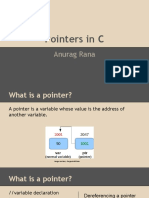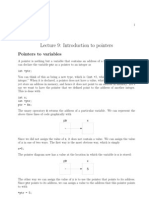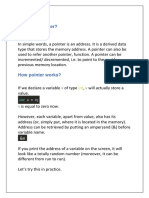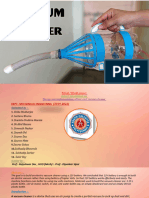BCSC 1102 : Intro To Programming Week 4
Dr. Shem Mbandu Angolo, PhD
The Co-operatetive University of Kenya
September - December 2024
Contents
1 Introduction to Pointers 2
1.1 Definition of a Pointer . . . . . . . . . . . . . . . . . . . . . . . . 2
1.2 Benefits of Using Pointers . . . . . . . . . . . . . . . . . . . . . . 2
2 Pointer Basics 2
2.1 Pointer Declaration and Initialization . . . . . . . . . . . . . . . 2
2.2 Pointer Dereferencing . . . . . . . . . . . . . . . . . . . . . . . . 2
2.3 NULL Pointer . . . . . . . . . . . . . . . . . . . . . . . . . . . . . 2
3 Pointer Arithmetic 3
3.1 Pointer Addition and Subtraction . . . . . . . . . . . . . . . . . . 3
3.2 Pointer Comparison . . . . . . . . . . . . . . . . . . . . . . . . . 3
4 Pointer Types and Casting 3
4.1 Void Pointers . . . . . . . . . . . . . . . . . . . . . . . . . . . . . 3
4.2 Pointer to Pointer . . . . . . . . . . . . . . . . . . . . . . . . . . 4
5 Scope and Lifetime of Pointers 4
5.1 Scope of Pointers . . . . . . . . . . . . . . . . . . . . . . . . . . . 4
5.2 Lifetime of Pointers . . . . . . . . . . . . . . . . . . . . . . . . . 5
6 Common Pointer Pitfalls 5
6.1 Dangling Pointers . . . . . . . . . . . . . . . . . . . . . . . . . . . 5
6.2 Wild Pointers . . . . . . . . . . . . . . . . . . . . . . . . . . . . . 6
6.3 Null Pointer Dereferencing . . . . . . . . . . . . . . . . . . . . . . 6
1
� 1 Introduction to Pointers
1.1 Definition of a Pointer
A pointer is a variable that stores the memory address of another variable.
Pointers are a powerful feature in C that allow for dynamic memory manage-
ment, efficient handling of variables, and direct memory manipulation.
1.2 Benefits of Using Pointers
• Direct Memory Access: Allows access to memory locations directly.
• Efficient Data Manipulation: Facilitates manipulation of large data
structures efficiently.
• Dynamic Data Structures: Essential for creating and manipulating
dynamic data structures like linked lists.
2 Pointer Basics
2.1 Pointer Declaration and Initialization
A pointer must be declared before it can be used to store the address of a
variable.
Syntax:
1 type * pointer_name ;
Example:
1 int * ptr ; // Declaration of an integer pointer
2 int x = 10;
3 ptr = & x ; // Initialization with the address of x
2.2 Pointer Dereferencing
Dereferencing a pointer means accessing the value stored at the memory address
the pointer holds.
Example:
1 int y = * ptr ; // y now holds the value of x (10)
2.3 NULL Pointer
A pointer that is not assigned any address is known as a NULL pointer. It is
good practice to initialize pointers to NULL to avoid accidental dereferencing.
Example:
2
�1 int * ptr = NULL ;
3 Pointer Arithmetic
3.1 Pointer Addition and Subtraction
Pointers can be incremented or decremented to point to the next or previous
memory location of the type they point to.
Example:
1 int x = 10;
2 int * ptr = & x ;
3 printf (" Address of x : % p \ n " , ptr ) ;
4 ptr ++; // Points to the next memory location
5 printf (" New address : % p \ n " , ptr ) ;
6 ptr - -; // Points back to the original address of x
7 printf (" Address of x : % p \ n " , ptr ) ;
3.2 Pointer Comparison
Pointers can be compared using relational operators. This is useful for checking
relationships between memory addresses.
Example:
1 int x = 10 , y = 20;
2 int * ptr1 = & x ;
3 int * ptr2 = & y ;
4
5 if ( ptr1 < ptr2 ) {
6 printf (" ptr1 points to a lower memory address than
ptr2 \ n ") ;
7 } else {
8 printf (" ptr1 points to a higher or same memory
address as ptr2 \ n ") ;
9 }
4 Pointer Types and Casting
4.1 Void Pointers
A void pointer is a pointer that can hold the address of any data type. It is
useful for generic programming tasks.
Example:
3
� 1 void printIntValue ( void * ptr ) {
2 printf (" Integer value : % d \ n " , *( int *) ptr ) ;
3 }
4
5 int main () {
6 int x = 10;
7 void * ptr = & x ;
8 printIntValue ( ptr ) ; // Output : Integer value : 10
9 return 0;
10 }
4.2 Pointer to Pointer
A pointer to a pointer stores the address of another pointer. It is used for more
complex memory manipulations.
Example:
1 int x = 5;
2 int * ptr1 = & x ;
3 int ** ptr2 = & ptr1 ; // Pointer to pointer
4 printf (" Value of x : % d \ n " , ** ptr2 ) ; // Output : Value
of x : 5
5 Scope and Lifetime of Pointers
5.1 Scope of Pointers
The scope of a pointer defines the region of the program where the pointer is
accessible.
• Local Scope: Pointers declared within a function are local to that func-
tion and cannot be accessed outside it.
• Global Scope: Pointers declared outside all functions are global and can
be accessed by any function in the program.
• Block Scope: Pointers declared within a block (e.g., within {}) are local
to that block.
Example:
1 int globalVar ; // Global variable
2
3 void function () {
4 int localVar ; // Local variable
4
� 5 {
6 int blockVar ; // Block - scoped variable
7 }
8 }
5.2 Lifetime of Pointers
The lifetime of a pointer refers to the period during which the pointer exists in
memory and retains its value.
• Automatic (Local) Variables: These variables are created when the
function is called and destroyed when the function exits.
• Static Variables: These variables retain their value between function
calls. They are initialized only once and exist for the lifetime of the pro-
gram.
• Global Variables: These variables exist for the entire lifetime of the
program.
Example:
1 void function () {
2 int localVar = 0; // Automatic variable
3 static int staticVar = 0; // Static variable
4
5 localVar ++;
6 staticVar ++;
7
8 printf (" localVar : %d , staticVar : % d \ n " , localVar ,
staticVar ) ;
9 }
10
11 int main () {
12 function () ; // Output : localVar : 1 , staticVar : 1
13 function () ; // Output : localVar : 1 , staticVar : 2
14 return 0;
15 }
6 Common Pointer Pitfalls
6.1 Dangling Pointers
A dangling pointer arises when an object is deleted or deallocated, but the
pointer still points to the memory location of the deallocated memory. Accessing
a dangling pointer can lead to undefined behavior.
Example:
5
� 1 int * c r e a t e D a n g l i n g P o i n t e r () {
2 int x = 10;
3 return & x ;
4 }
5
6 int main () {
7 int * danglingPtr = c r e a t e D a n g l i n g P o i n t e r () ;
8 printf ("% d " , * danglingPtr ) ; // Undefined behavior
9 return 0;
10 }
6.2 Wild Pointers
Wild pointers are pointers that have not been initialized to a valid address.
They can cause a program to crash or behave unpredictably.
Example:
1 int main () {
2 int * wildPtr ; // Uninitialized pointer
3 * wildPtr = 10; // Undefined behavior
4 return 0;
5 }
6.3 Null Pointer Dereferencing
Dereferencing a NULL pointer results in a segmentation fault, causing the pro-
gram to crash.
Example:
1 int main () {
2 int * nullPtr = NULL ;
3 printf ("% d " , * nullPtr ) ; // Segmentation fault
4 return 0;
5 }






















































































